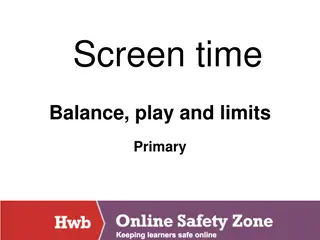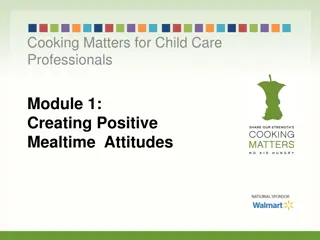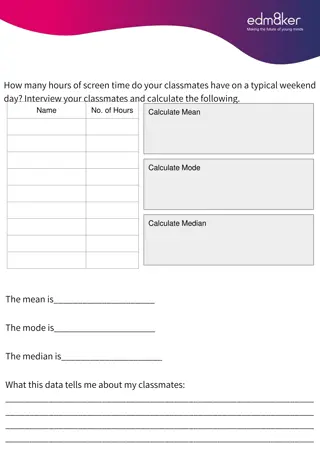Understanding Screen Time: A Project to Promote Healthy Habits
Providing information to young people and parents on screen time guidelines, reasons to reduce entertainment screen time, benefits of cutting down screen time, and tips for engaging in screen-free activities. Exploring what screen time is, statistics on screen usage in Scotland and Glasgow, and guidelines for managing screen time for children based on recommendations by health organizations.
Download Presentation

Please find below an Image/Link to download the presentation.
The content on the website is provided AS IS for your information and personal use only. It may not be sold, licensed, or shared on other websites without obtaining consent from the author. Download presentation by click this link. If you encounter any issues during the download, it is possible that the publisher has removed the file from their server.
E N D
Presentation Transcript
Aims of Project To provide information to young people & parent/guardian on: What is screen time Screen time guidelines Reason to cut down on entertainment screen time Benefits of cutting down entertainment screen time Tips for parents & young people on screen-free activities at home & neighbourhood
What is screen time? Screen time is a term used for activities done in front of a screen, such as watching TV, working on a computer, tablet, laptop, mobile phone or playing video games. Screen time is sedentary activity, meaning you are being physically inactive while sitting down.
In Scotland On average young people spend about 6 hours a day in front of screens for entertainment 76% of Scottish 11-15yr olds report more than 2 hours per day of TV alone 77% of boys and 37% of girls report 2 hours per day of gaming
In Glasgow In Glasgow 96% of young people in S1 to S6 interviewed for the Health & Wellbeing Survey 2014, have stated they spend more than an hour to 16 hours a day in front of screens on a weekday.
Screen Time Guidelines SIGN Guidelines 2010, NICE guidelines 2015 recommend: No more than two hours of sedentary behaviour, particularly of screen time (TV watching, computer use and playing video games), for children per day American Academy of Pediatrics Screen Time Guidelines recommend: For children younger than 18 months, avoid use of screen media other than video-chatting. Parents of children 18 to 24 months of age who want to introduce digital media should choose high-quality programming, and watch it with their children to help them understand what they're seeing.
For children ages 2 to 5 years, limit screen use to 1 hour per day of high-quality programs. Parents should co-view media with children to help them understand what they are seeing and apply it to the world around them. Children ages 6 and older, place consistent limits on the time spent using media, and the types of media, and make sure media does not take the place of adequate sleep, physical activity and other behaviors essential to health.
Designated media-free times together, such as dinner or driving, as well as media-free locations at home, such as bedrooms. Ongoing communication about online citizenship and safety, including treating others with respect online and offline.
Reasons to cut down on screen time Time spent with screens is associated with: - childhood obesity - sleep disturbance - attention span issues - poor school performance
Reasons to cut down on screen time Young people who watch 3 or more hours of television daily are at especially high risk for poor homework completion, negative attitudes toward school, poor grades and long term academic failure Young people with a television in their bedroom spend more time watching TV and report less physical activity, less healthy dietary habits, worse school performance and fewer family meals
Tips for Parents Negotiate how to spend the recommended screen time every day Turn off the TV & other devices during meals. Remember family meals are a good time to talk to each other Agree to turn OFF all devices at night Make bedrooms tech-free zones no TV, game consoles, mobiles & other portable devices
Tips for Parents It is important to speak as a family about the use of screens & the effect they can have on health & academic performance Encourage other types of fun that include physical & social activities, like joining a sports team or club Agree on a weekly schedule, so as a family you can find a balance between screen time & time for family, friends, school, physical activity, school work & sleep
How can parents help? Support your child with the Be Screen Smart Project Parents can be good role models by limiting their entertainment screen time too By setting an example of how parents balance family life, physical, social activities as well as use of electronic screens parents can LEAD BY EXAMPLE
Services 0-12 or Teen Triple P Groups for more information please contact Central Parenting Team on: 0141 277 7570
Online Safety https://www.thinkuknow.co.uk/ https://www.commonsensemedia.org/ https://www.internetmatters.org/ https://www.saferinternet.org.uk/advice- centre/parents-and-carers






















